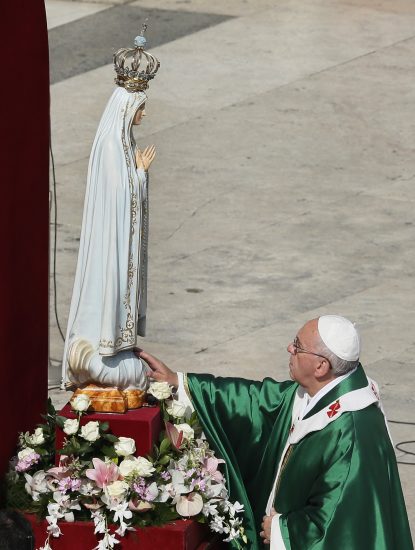
Pope Francis touches the original statue of Our Lady of Fatima after consecrating the world to Mary at the end of a Mass in honor of Mary in St. Peter’s Square at the Vatican in this Oct. 13, 2013, file photo. The pope has invited the bishops of the world to join him in “consecrating and entrusting” Russia and Ukraine to Mary March 25. (CNS photo/Paul Haring)
VATICAN CITY (CNS) — While Pope Francis and bishops around the world will consecrate themselves and all humanity to the Immaculate Heart of Mary, they will include the phrase, “especially Russia and Ukraine.”
In the text of the pope’s prayer sent to chanceries around the globe so that bishops can join the pope March 25, a key passage for many observers reads: “Mother of God and our mother, to your Immaculate Heart we solemnly entrust and consecrate ourselves, the church and all humanity, especially Russia and Ukraine.”
(See the text in English and in Spanish.)
With Russia’s invasion of Ukraine and responding to a request particularly from Ukrainian bishops, Pope Francis had announced that he would make the act of consecration during a previously scheduled Lenten penance service in St. Peter’s Basilica.
Cardinal Konrad Krajewski, the papal almoner, will lead the act of consecration at the same time at the Shrine of Our Lady of Fatima in Portugal. When Mary appeared to three shepherd children at Fatima in 1917 with a message encouraging prayer and repentance, she also asked for the consecration of Russia to Mary’s immaculate heart.
While popes, especially St. John Paul II in 1984, made acts of consecration, they did not mention “Russia” out loud, which led some people to think that the Fatima request had not been fulfilled, even though the last surviving visionary, Sister Lucia dos Santos, said St. John Paul had done so.
The papal text pleads with Mary to “accept this act that we carry out with confidence and love. Grant that war may end, and peace spread throughout the world.”
[hotblock]
By saying “yes” to God’s plan — an event remembered on the March 25 feast of the Annunciation — Mary “opened the doors of history to the Prince of Peace,” the prayer says. “We trust that, through your heart, peace will dawn once more.”
“To you we consecrate the future of the whole human family, the needs and expectations of every people, the anxieties and hopes of the world,” the prayer says.
Written with the penance service and the Fatima call to repentance in mind, the pope began the prayer with a statement of trust in Mary’s maternal love for all believers.
“You never cease to guide us to Jesus, the prince of peace,” the prayer says. “Yet we have strayed from that path of peace.”
Humanity, it says, has forgotten the lessons of the 20th century with its “sacrifice of the millions who fell in two world wars.”
What is more, it says, “we have disregarded the commitments we made as a community of nations. We have betrayed peoples’ dreams of peace and the hopes of the young.”
[tower]
“We grew sick with greed, we thought only of our own nations and their interests, we grew indifferent and caught up in our selfish needs and concerns,” the text says.
“We chose to ignore God, to be satisfied with our illusions, to grow arrogant and aggressive, to suppress innocent lives and to stockpile weapons,” it continues, acknowledging also how people have “ravaged the garden of the earth with war.”
“By our sins,” it says, “we have broken the heart of our heavenly Father, who desires us to be brothers and sisters.”
“Now with shame we cry out: Forgive us, Lord,” the pope wrote.
The abiding presence of Mary, the text says, is a reminder that God never abandons people and is always ready to forgive.
“In every age you make yourself known to us, calling us to conversion,” the pope wrote. “At this dark hour, help us and grant us your comfort. Say to us once more: ‘Am I not here, I who am your Mother?'” as Our Lady of Guadalupe said to Juan Diego.
Like at the wedding feast of Cana, the text says, “in our own day we have run out of the wine of hope, joy has fled, fraternity has faded. We have forgotten our humanity and squandered the gift of peace. We opened our hearts to violence and destructiveness. How greatly we need your maternal help!”
“Amid the thunder of weapons, may your prayer turn our thoughts to peace,” the pope wrote. “May your maternal touch soothe those who suffer and flee from the rain of bombs. May your motherly embrace comfort those forced to leave their homes and their native land. May your Sorrowful Heart move us to compassion and inspire us to open our doors and to care for our brothers and sisters who are injured and cast aside.”
PREVIOUS: After frightening trip, Ukrainian families welcomed in Polish convents
NEXT: El texto para la consagración de Rusia y Ucrania


Share this story